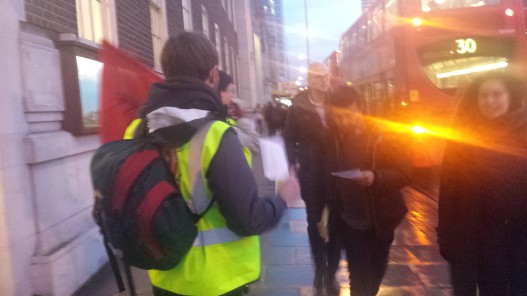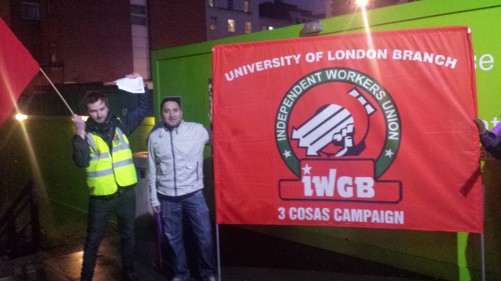Words and photos by Jake Céileachair
The demonstration I went to last Friday outside of the Euston Friends’ Meeting House was buzzing. By the time I left, the crowd had swelled to more than 60 people, ranging from sympathetic passersby, curious onlookers, drummers and campaigners from all across London. They were protesting against what they saw as the unfair dismissal of three employees by Britain Yearly Meeting (BYM), the charity that operates the Friends’ House. In BYM’s published statement on the matter what stuck out most was the opening paragraph:
“BYM is a Living Wage Employer, and is recognised by the Equality Trust for the strict 1:4 ratio between lowest and highest paid staff. Our lowest wage band starts at 19% above the London Living Wage. All staff receive generous benefits, including 8% employer pension contribution, subsidised meals, permanent health insurance, childcare vouchers, a cycle-to-work scheme and access to a free confidential employee assistance programme.”
But the radical trade union the Industrial Workers of the World (IWW) isn’t buying it. While they have publicly stated that paying above the Living Wage (which in London is meant to be £9.15) is to be applauded, the IWW says it’s moot in circumstances in which employees are not guaranteed the necessary hours to provide for themselves.

One of these employees, Martin Nickolay-Blake said: “Because we pushed [to] phase out zero hours contracts, the building management decided to agree to just that – by firing us. We didn’t expect this, as the workforce and management had an informal agreement promising that no jobs would be axed, but from the way we were sacked it’s clear that this was politically motivated.”
Whether the sackings were really politically motivated or not, many activists and trade unionists have seen this as an affront to the livelihoods of three people. In fact, after speaking to several demonstrators on Friday, I was came to realise this protest is just one chapter of a much larger saga.

Perhaps the most impressive thing about the protest was the presence of the International Workers Union of Great Britain (IWGB), a “worker-run union organising the unorganised, the abandoned and the betrayed”. The branch of the IWGB specific to University of London recently exploded in size due to their 3 Cosas Campaign demanding full employee rights (ie. sick pay, pensions and holidays) for the university’s predominantly migrant cleaning staff.
I spoke to Jason, the President of IWGB, and he explained: “The reason why we’re here is because although our focuses are slightly different, we’re still campaigning on the same issue, which is the precarious situation workers face in this country. Zero hours contracts are just one example of that”.
Hannah Webb, a UCL student and former UCL Union Sabbatical Officer, who also joined the picket told me: “Having solidarity with workers is an extremely important act. It helps us to combat precarious and low paid work that so many of us are in. Students need to remember that they themselves will likely be in this same situation either when they graduate or when they find work to support their education.”

Zero hours contracts and other issues related to low wage work are so problematic in the UK, in part, because we have so little information on their impacts on households. Despite UCL’s promise that, within six months of graduation, approximately 90% of undergraduates enter the workforce or pursue additional studies, there’s very little data on what sort of hours people work. We know that unemployment technically fell to 1.91 million in 2015, but someone with a zero hours contract is lumped in to the same statistics as those that “enjoy” full-time hours.

After the protest I talked to David Dahlborn, UCLU Halls & Accommodation Representative, who was as enthusiastic as ever, telling me:
“Looking at the IWW, what I think is inspiring is the solidarity and mutual support – people standing up for one another. There were cleaners there, and students and office workers united against an injustice, determined to right a wrong. To me this principle is what a union – a trade union or a students union – is about: mutual support and assistance for justice and equality. And the impressive thing is that this works throughout society – the same principle of solidarity and support can be applied in the UCLU rent campaign. If you unite to improve something you believe in and don’t back down when the bosses say it’s impossible, that’s when you can change the world – be it by cutting the rent, winning a better standard of living in student accommodation or abolishing tuition fees!”
In the end, the question prescient at this specific protest – whether or not the fired employees of the Friends’ Meeting House will keep their jobs – remains unanswered. Martin seems confident they will.
